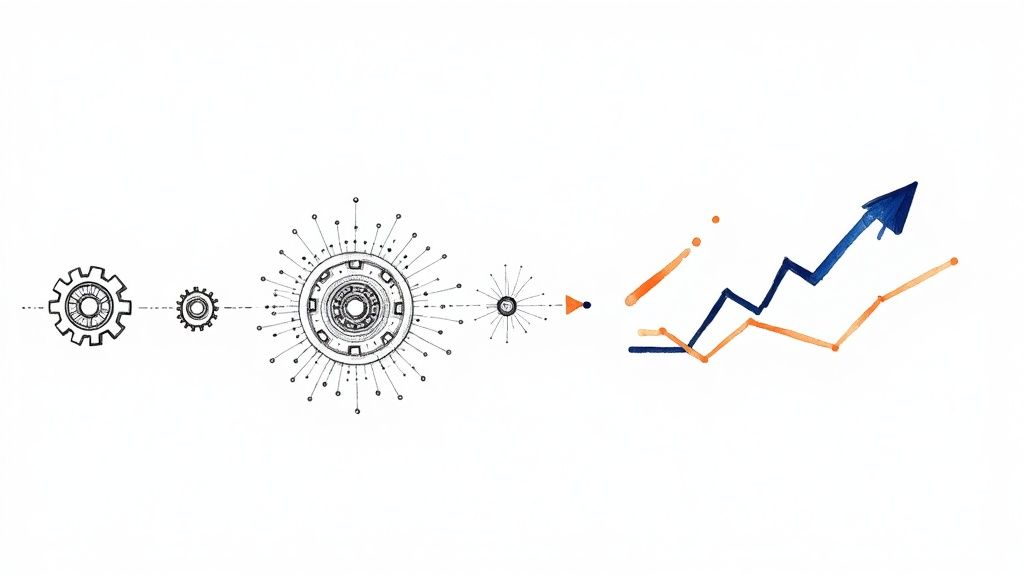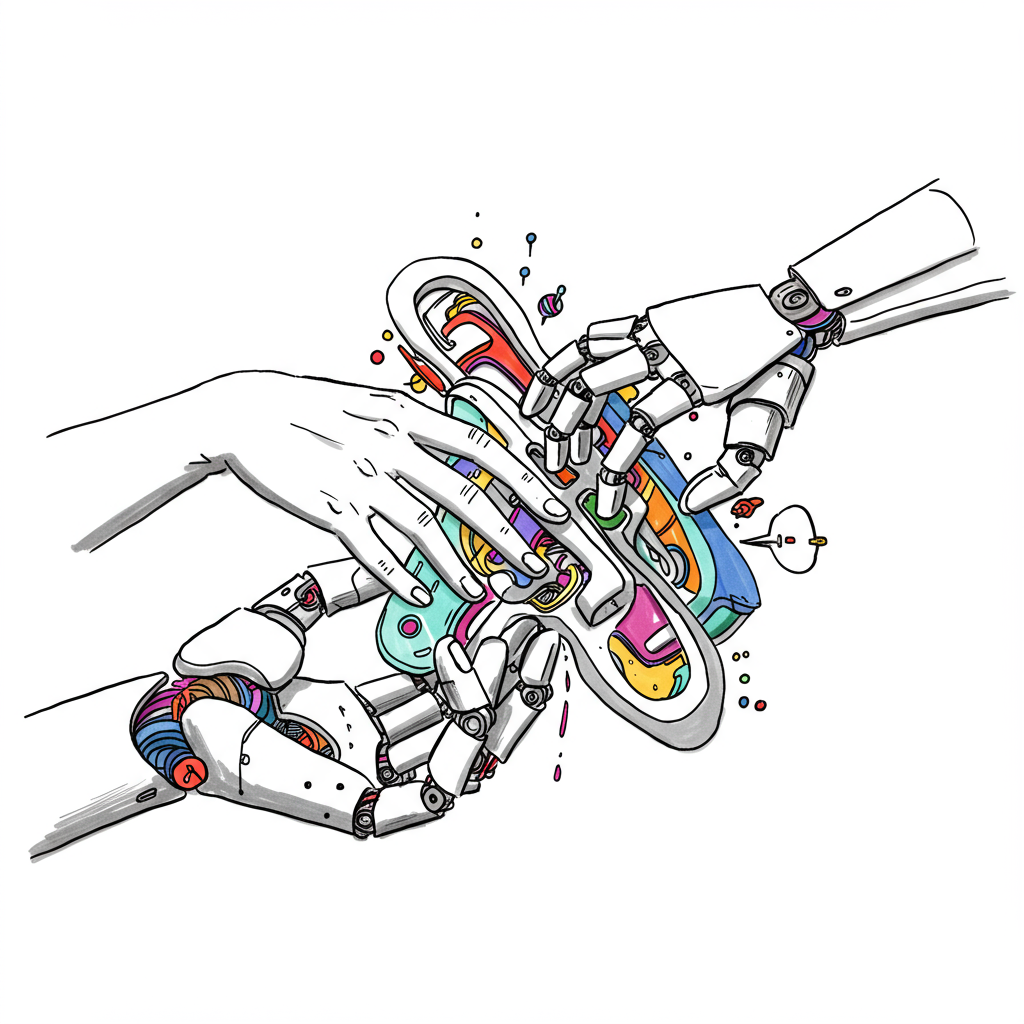What an AI Automation Agency Actually Does
Discover how a modern AI automation agency drives real business growth. Learn about core services, tangible benefits, and how to choose the right partner.
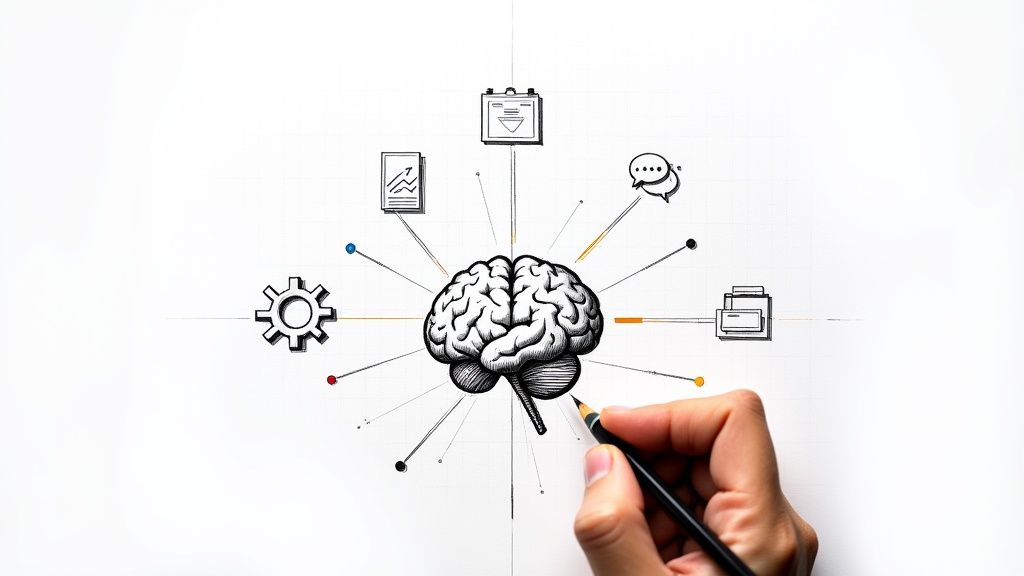
Think of an AI automation agency as a specialist partner dedicated to weaving intelligent automation into the very heart of your business operations. They're not like a typical tech supplier. Their entire focus is on using artificial intelligence to tackle major hurdles like inefficiency, spiralling costs, and the roadblocks you hit when trying to scale up. The end goal is to build a smarter, more robust organisation.
What an AI Automation Agency Actually Does
It helps to see an AI automation agency less as a simple service provider and more as a strategic architect for your company's future. Their main objective is to go far beyond basic task automation and embed smart systems deep into your operational DNA. They are expert guides, showing you how to navigate the complex world of AI to get real, tangible results for your business.
The relationship usually kicks off with high-level AI strategy consulting, where the agency dives deep to understand your specific challenges and pinpoints the best opportunities for automation. This isn't about slapping on a generic, one-size-fits-all solution. It’s a custom-built process to make sure the technology directly serves your business goals. If you're looking to brush up on the basics, it's worth exploring resources that explain what AI is and its potential business benefits.
More Than Just a Tech Vendor
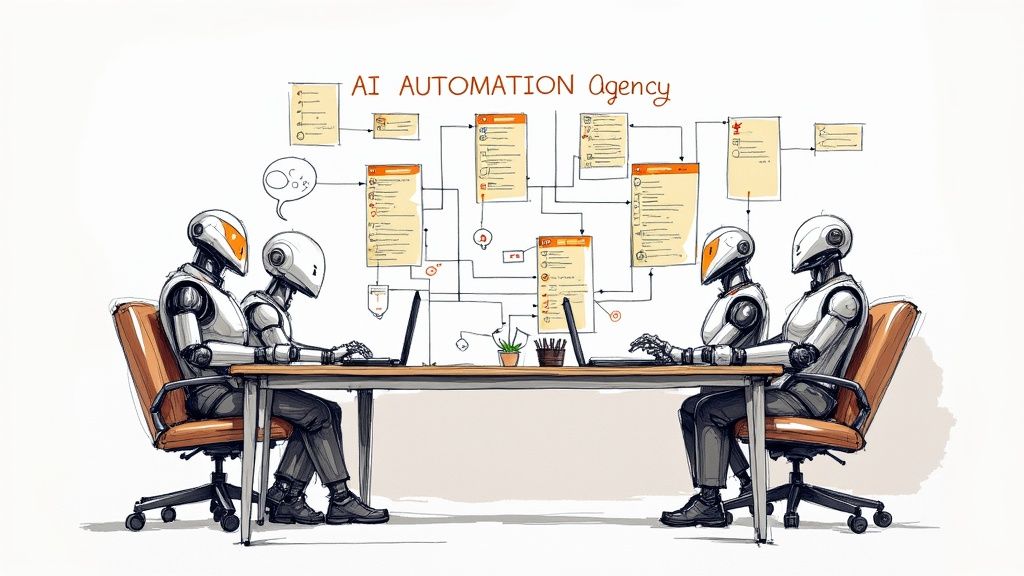
What truly sets them apart is their focus on complete solutions, not just isolated pieces of software. A freelance developer might build you an app, but an AI automation agency designs and implements entire systems that work together to streamline your whole workflow. Their work is a mix of deep technical skill and sharp business sense.
An AI automation agency's real value is its ability to turn complex AI technology into practical, results-focused business processes. They are the bridge between what the tech can do and what your operations need it to do.
This comprehensive approach means they're with you from start to finish. It’s not just about installing some software and walking away. It's about creating a living ecosystem of intelligent automation that evolves as your business grows. This is often delivered through a model known as AI Automation as a Service, which includes continuous support and optimisation.
Core Functions and Objectives
Everything an agency does is designed to produce specific, measurable improvements. Their work usually involves:
Process Analysis: Digging into your current workflows to find the bottlenecks, repetitive tasks, and inefficiencies that are perfect candidates for automation.
Solution Design: Architecting custom AI systems to solve those specific problems, whether it's a sophisticated chatbot for customer service or an advanced model for analysing sales data.
System Integration: Making sure the new AI tools plug in perfectly with the software you already use, like your CRM, ERP, and other critical platforms.
Performance Optimisation: Constantly monitoring and tweaking the automated systems to make them as efficient, accurate, and profitable as possible.
At the end of the day, their main purpose is to free up your team from the mundane, repetitive work. This allows your people to focus on the bigger-picture stuff that needs creativity, strategic thinking, and human judgment. By achieving this, they don't just increase productivity—they open up entirely new paths for innovation and growth.
What an AI Automation Agency Actually Does
To really get what an AI automation agency can do for you, you need to look past the buzzwords and at the actual services they provide. It’s not about selling you a piece of software off the shelf. It’s about working with you to fundamentally rethink how your business operates, piece by piece. The whole thing is a journey, starting with a solid plan before a single line of code is written.
That partnership usually kicks off with some in-depth AI strategy consulting. Here, the agency’s experts will sit down with your team to properly understand your daily headaches, where you want to be in a few years, and what tech you’re already using. It’s a collaborative process that makes sure every decision from that point on is pulling in the right direction for your business.
This initial deep dive doesn’t just end with a handshake and some vague ideas. It produces a concrete, actionable plan – often called a Custom AI Strategy report. Think of it as a detailed blueprint for your company's AI journey. It lays out what to do first, what the likely return on investment will be, and provides a clear, step-by-step roadmap so you’re never left guessing what’s next.
From Strategy to Action
With a solid plan in place, the focus shifts to making it happen. This is where the theoretical perks of AI become a practical part of your daily operations. A huge part of this is building custom automation solutions designed to solve your biggest, most time-consuming problems.
These solutions can be anything from smart customer service chatbots that handle queries around the clock to sophisticated internal tools that take care of tedious back-office work. We’re talking about things like data entry, generating reports, or even handling the paperwork for new hires. The key is that these aren’t one-size-fits-all fixes; they're built to slot perfectly into how you work.
The whole development process is thorough. It starts with a detailed analysis to pin down exactly what the project needs to do. From there, the agency’s team manages everything: building the tool, testing it rigorously, and integrating it smoothly with your existing systems to make sure there are no disruptions.
The best AI automation agencies don’t just deliver software; they deliver fully integrated operational systems. Their goal is to create a seamless environment where your people and the technology work together, each making the other better.
This image really breaks down the main benefits businesses see when they get these core services right.
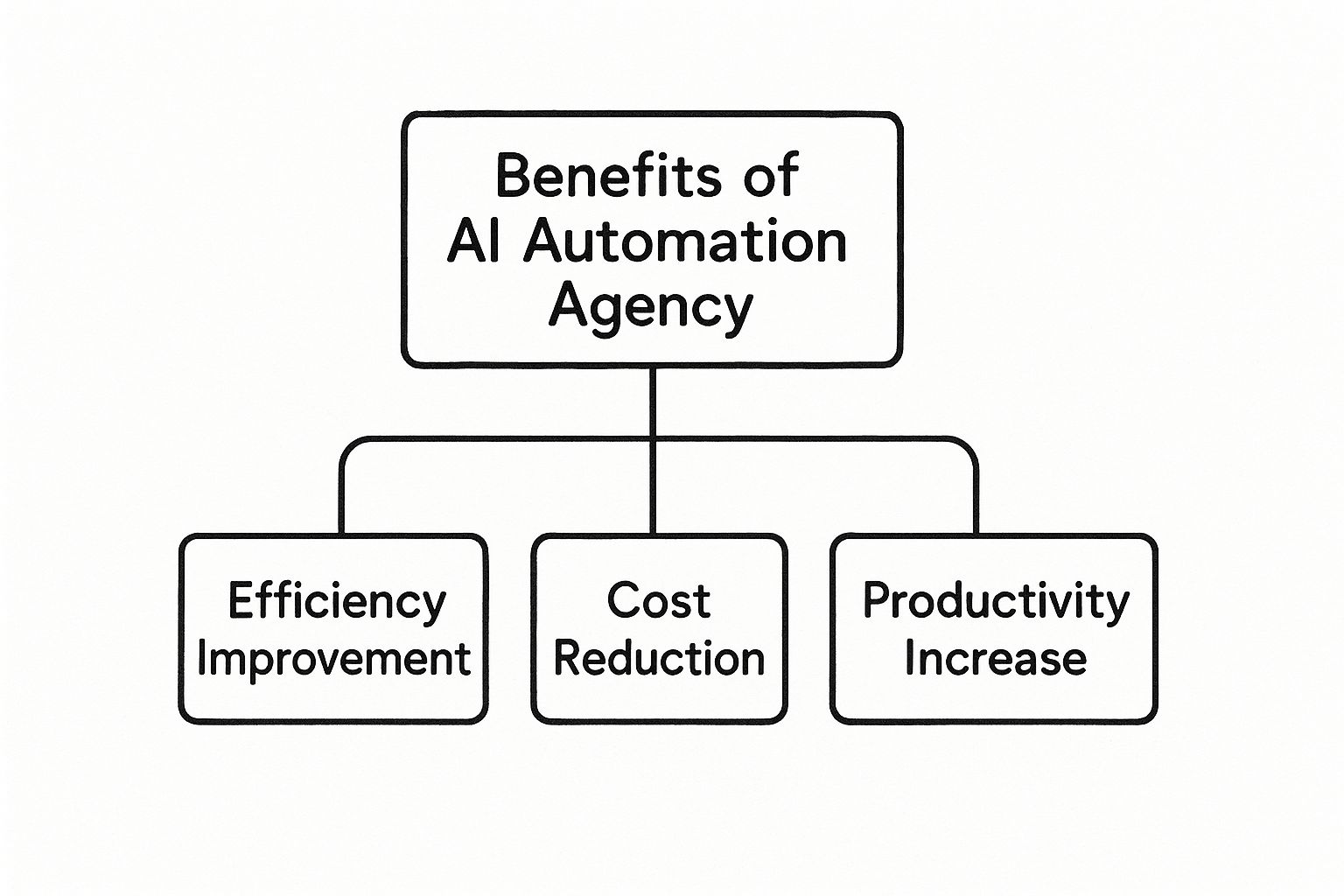
As you can see, the services an agency offers lead directly to real, measurable wins in efficiency, cost savings, and overall productivity.
To give you a clearer picture, here’s a quick summary of the core services you should expect from a top-tier AI automation agency.
Key Services of an AI Automation Agency
Service Offering | Description | Primary Business Benefit |
|---|---|---|
AI Strategy Consulting | A deep dive into your business to identify opportunities and create a customised AI roadmap. | Provides a clear, data-driven plan to ensure AI investment aligns with business goals and delivers maximum ROI. |
Custom AI Solutions | Developing bespoke AI tools, chatbots, and automation workflows tailored to your specific operational needs. | Solves unique business challenges that off-the-shelf software can't, boosting efficiency and competitive edge. |
Data & Analytics | Implementing AI-powered systems to analyse business data, uncover insights, and predict future trends. | Enables smarter, faster decision-making based on predictive insights rather than historical guesswork. |
Systems Integration | Seamlessly connecting new AI tools with your existing software stack (CRM, ERP, etc.) to create a unified system. | Eliminates data silos and manual data transfer, ensuring a smooth flow of information across the entire organisation. |
Ongoing Support & Optimisation | Providing continuous maintenance, updates, and performance monitoring for all deployed AI solutions. | Guarantees long-term value and ensures your AI systems adapt and improve as your business evolves. |
By offering a complete package from strategy to support, these agencies become long-term partners in your growth.
A Partnership for the Long Haul
The job isn’t done when a new tool goes live. The best agencies stick around to provide ongoing support and fine-tuning. This ensures the systems they build keep working perfectly, adapt as your business changes, and continue to provide value long after the initial project is finished.
This full-service model is becoming essential. In the UK, the AI market is booming, part of a global trend that’s expected to see the market hit around $748 billion in 2025. This growth is being driven by real results. For instance, Deloitte's use of AI chatbots in its UK audit teams has jumped to 75%, showing just how much businesses are relying on AI to get more done.
Ultimately, it’s this commitment to the entire lifecycle—from the initial idea to long-term partnership—that sets a great AI automation agency apart. Understanding these core services helps you find a partner who can deliver not just tech, but real, lasting change for your business.
What AI Automation Actually Looks Like in the Real World
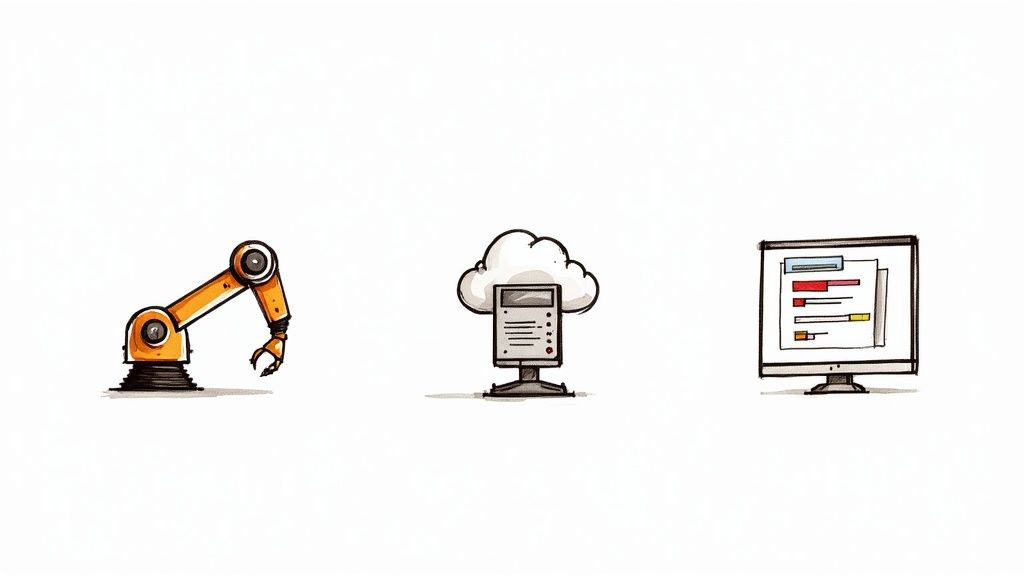
Let's move past the theory. When you bring an AI automation agency on board, what really changes? The results aren't just abstract concepts; they show up in your day-to-day work, on your balance sheet, and in your team's newfound freedom to think bigger. The most immediate change you'll see is a massive jump in operational efficiency.
Think about all the repetitive, manual jobs that soak up hours every week – data entry, processing invoices, or handling those first-line customer questions. By automating them, you free up your people. Their skills are no longer buried in busywork but are focused on strategic projects that genuinely push the business forward. It's not about doing things faster; it's about doing the right things.
This efficiency boost has a direct, positive effect on your bottom line. Automated systems can run around the clock without the costs tied to manual work, drastically reducing human error and making sure your resources are used wisely, whether in your supply chain or your finance department.
Making Sharper Decisions, Backed by Data
Another huge win is simply making better decisions. Data is gold in today's market, but having heaps of it is useless if you can't make sense of it. An AI automation agency helps build systems that cut through the noise and find the clear signals.
AI-powered analytics can chew through enormous amounts of information in real-time, spotting patterns and predicting what's coming next. This means your leadership team can move beyond gut feelings and historical reports. Instead, they can make confident, strategic moves based on solid predictive models.
The real magic of AI in business isn't just doing the same old tasks on autopilot. It's about uncovering what you should do next, guided by intelligent data analysis on a scale no human team could manage.
This data-driven mindset starts to filter down through the whole company. Marketing teams can tweak campaigns based on predicted customer behaviour, while operations managers can see maintenance issues coming before they cause costly downtime. As we explored in our AI adoption guide, the right partner is key to making this a reality.
Finally, a Way to Genuinely Scale Your Business
The ultimate benefit is true scalability. In the past, growing your business meant growing your payroll and resource costs right along with it. A spike in orders meant a hiring spree, and a new market meant a huge upfront investment.
AI-driven systems completely change that dynamic. Automated workflows can handle a sudden surge in demand without the frantic rush to hire and train new people. A chatbot can handle ten thousand customer queries just as easily as it handles ten, keeping your service quality high as you grow.
This lets your business expand without a proportional rise in costs or complexity. It's how you build a company that can react quickly to market shifts and grab new opportunities without being bogged down by its own weight. This is a central part of our AI Automation as a Service philosophy.
The move towards AI automation in UK businesses has really gathered pace. Recent figures show that 52% of UK companies are now using it in some form. Of those, a staggering 92% have seen revenue growth they can directly trace back to AI, and their staff are spending 40% less time on repetitive tasks. You can read more about these UK automation trends and their impact.
By investing in a smart AI strategy, businesses aren't just getting more efficient – they are completely redefining their potential for growth. It all starts with spotting where you can improve and finding an expert team to help you make it happen.
How Different Industries Are Putting AI Automation to Work
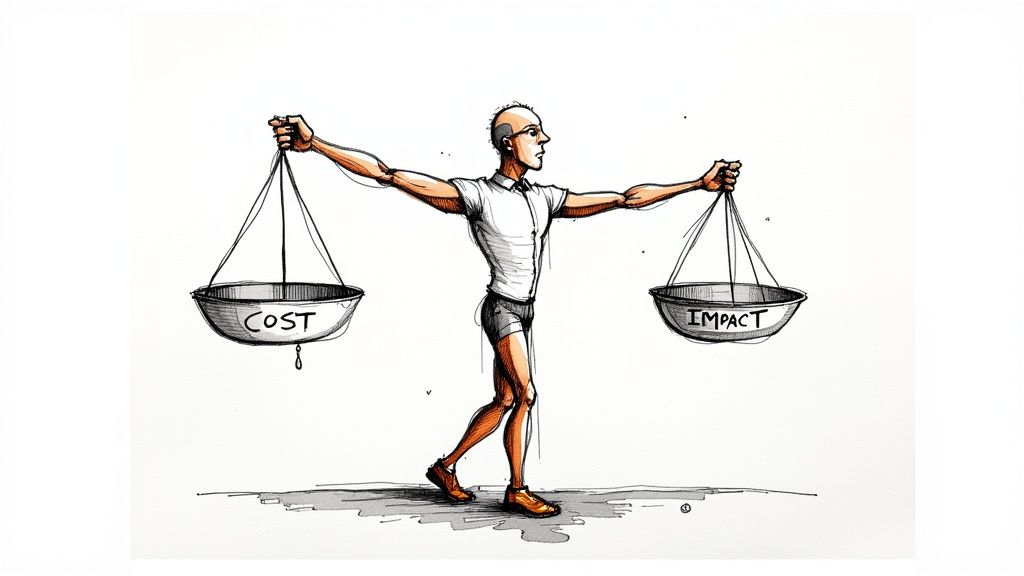
It’s one thing to talk about the benefits of an AI automation agency in theory, but it’s another to see it in action. So, let's get practical and look at how this technology is actually solving real problems for businesses right now. These aren’t just ideas on a whiteboard; they are proven, results-driven solutions tackling specific industry headaches. A quick look through a library of real-world use cases shows just how powerful these partnerships can be.
What you'll notice is that AI automation is never a one-size-fits-all product. A good agency applies its AI Automation as a Service model to pinpoint your unique operational bottlenecks and then builds a solution that fits perfectly. This is exactly what we mean by AI co creation—we roll up our sleeves and work with you to build something that genuinely helps.
It all starts with a deep dive, usually through AI strategy consulting. The outcome is a Custom AI Strategy report that clearly identifies where you'll get the most bang for your buck. From there, we map out the AI Product Development Workflow to turn that strategy into a working reality.
Retail and E-commerce Automation
In the cut-and-thrust world of retail, anticipating what your customers want is the name of the game. An AI automation agency can help a business get ahead of the curve, moving from just reacting to demand to actively predicting it. Picture an AI system sifting through your sales history, spotting seasonal patterns, and even keeping an eye on social media trends to forecast demand for a product with startling accuracy.
This gives retailers the power to fine-tune their stock levels, dodging the twin pains of costly overstock and sales-killing stockouts. At the same time, AI-powered chatbots can handle thousands of customer queries at once—answering questions about orders, returns, and products 24/7, which frees up your human team to tackle the more complex, high-value conversations.
Finance and Banking Transformation
The financial world runs on three things: speed, security, and precision. This makes it fertile ground for AI automation. Agencies in this space develop sophisticated algorithms that can monitor thousands of transactions a second to flag fraudulent activity in real time. These systems are brilliant at spotting subtle, unusual patterns that a human analyst could easily miss, saving banks and their customers millions.
It's not just about security, though. AI can automate the entire loan application process, instantly checking an applicant's data against lending criteria. This slashes approval times from weeks down to mere minutes. These kinds of powerful internal tooling solutions don't just boost efficiency; they also help banks stay compliant with ever-stricter regulations. An upfront AI requirements analysis is vital to get these mission-critical systems right from the start.
Manufacturing and Industrial Efficiency
On the factory floor, every minute of downtime costs money. That's why predictive maintenance has become one of the most powerful applications of AI in manufacturing. An agency can fit sensors to key machinery, which then feed a constant stream of data to a machine learning model.
The AI learns what "normal" looks like for each machine and can then predict potential failures before they happen. This lets maintenance crews schedule repairs proactively, dramatically reducing unexpected downtime and making expensive equipment last longer.
This simple shift takes a manufacturer from a reactive "break-fix" mentality to a far more efficient, predictive operational model. It’s a perfect illustration of how the right AI tools for business can deliver a massive return on investment.
Healthcare and Patient Care
Healthcare is another sector being quietly revolutionised by intelligent automation. An AI automation agency can build systems that take care of the mountain of administrative work—like patient scheduling, billing, and data entry—that currently eats up so much of a clinician's valuable time. To see how this works in practice, you can explore our specialised AI solutions for the healthcare industry.
Beyond the admin, AI-powered diagnostic tools are also making a huge impact. They can analyse medical images like X-rays and MRIs, helping radiologists spot potential issues faster and with greater accuracy. Think of it as a second pair of expert eyes, augmenting the skills of medical professionals and ultimately leading to better patient outcomes. Our own AI Strategy consulting tool is designed to help healthcare providers map out these kinds of complex projects.
Ultimately, these examples, tailored by our expert team, show how a skilled AI automation agency delivers specific, measurable value, one industry at a time.
How to Choose the Right AI Agency Partner
Picking an AI automation agency is a big deal. This decision will directly influence how efficiently your company runs and how fast it grows in the years ahead. You're not just hiring another supplier; you're looking for a strategic partner who genuinely gets your vision and has the technical chops to make it happen. The best partnerships are built on a foundation of AI co-creation, where your deep industry knowledge meets their technical expertise to build something truly effective.
So, where do you start? The first thing to check is their technical expertise. Make sure it's deep and verifiable. Their team shouldn't just be good at one slice of AI; they need a solid grasp of multiple disciplines, from machine learning and natural language processing to data science. This breadth is vital because real business problems are messy and rarely solved by a single, off-the-shelf tool.
Just as important is a proven track record of successful projects, ideally in your industry or a closely related one. Don't be shy about asking for their portfolio or browsing through their library of real-world use cases. A confident, top-tier agency will be keen to show you exactly how they’ve delivered measurable results for other businesses. It's proof they can turn a good idea into a great return on investment.
Beyond the Technical Checklist
While technical skills are non-negotiable, the best partners bring a strategic mind to the table. Look for an agency that kicks off the conversation with high-level AI strategy consulting, not one that immediately tries to sell you on a specific piece of tech. Their first job should be to understand your fundamental business challenges.
A great way to gauge this strategic depth is to see how they use technology themselves. Does the agency use its own advanced tools? For instance, an agency that has developed its own AI Strategy consulting tool or offers a suite of proprietary AI tools for business is clearly serious about innovation. It shows they don’t just talk about AI; they live and breathe it.
A true AI partner invests in your success. They should be more interested in building a long-term relationship based on tangible results than in completing a one-off project.
This partnership-first approach is crucial for complex projects, like developing custom internal tooling or navigating an entire AI Product Development Workflow. It’s what ensures the final solution is perfectly matched to how your business actually operates. As we have covered in our AI adoption guides, this alignment is often the key difference between a successful project and a costly misstep.
Agency Evaluation Checklist
To help you properly vet a potential AI automation agency, it's useful to have a framework. The table below outlines what to look for—and what to watch out for—during your evaluation process. Think of it as a checklist to ensure you're asking the right questions and looking beyond the sales pitch.
Evaluation Criterion | What to Look For | Red Flags to Avoid |
|---|---|---|
Technical Expertise | A diverse team with skills in ML, NLP, data science, etc. Proven experience with relevant tech stacks. | A narrow focus on just one tool or platform. Vague answers about their team's qualifications. |
Industry Experience | A portfolio of successful projects in your sector or with similar business challenges. | No relevant case studies or an unwillingness to share specific project details. |
Strategic Approach | They ask "why" before "how." They focus on your business goals first and technology second. | They jump straight to a solution before fully understanding your problem. They push a one-size-fits-all product. |
Communication | Clear, transparent, and regular updates. A dedicated point of contact who understands your project. | Poor response times. Overly technical jargon without explanation. A disorganised communication process. |
Post-Launch Support | A clear plan for ongoing maintenance, support, and optimisation. | Vague promises about support or a support model that feels like an afterthought. |
Cultural Fit | A collaborative, partnership-oriented mindset. They feel like an extension of your own team. | A purely transactional relationship. A rigid "our way or the highway" attitude. |
Using this checklist will help you systematically compare different agencies and identify the one that is truly the best fit for your long-term goals.
Key Questions to Ask Potential Partners
To dig deeper, you need to ask a few direct questions. These will help you get a real feel for their processes, values, and capabilities.
Here are some essential questions to get you started:
How do you handle project management and communication? Look for clear, transparent processes that will keep you in the loop at every stage.
What does your support and maintenance model look like after deployment? The work isn’t done at launch; a good partner will stick around to provide ongoing optimisation.
Can you walk me through a detailed case study of a project similar to ours? This reveals their problem-solving approach and their real-world ability to deliver results.
How do you measure success and what KPIs do you track? Their answer should be all about business outcomes, like cost savings or revenue growth, not just abstract technical metrics.
Choosing the right agency is a critical step in your automation journey. By focusing on a blend of technical skill, strategic vision, and a genuinely collaborative spirit, you can find a partner who will help you build a more intelligent, efficient, and future-ready organisation. The expertise and approach of our expert team are built around these exact principles.
Ready to Take the First Step? Here’s How to Get Started
The move toward intelligent automation doesn't start with some massive, company-wide overhaul. It begins with a single, clear decision to explore what's possible. We've walked through what a specialised AI automation agency can do, from crafting the initial strategy to getting the tech up and running. The takeaway is simple: for any business that wants to stay in the game, AI isn't a future dream; it's a present-day necessity.
So, where do you begin? It starts by looking inward. Think about the repetitive tasks that bog down your team day after day. Where could you use sharp, data-driven insights to make better decisions? Our team is here to guide you through that discovery process. This isn't just some passing trend, either. The UK's AI sector is exploding, growing by 85% to 5,800 companies between 2023 and 2025, with revenues now hitting a staggering £23.9 billion. That number shows just how big the opportunity really is.
Charting Your Course
Making that first move can feel like a big deal, but it really doesn't have to be. For many businesses, a great starting point is understanding a practical application, like the process of implementing an AI sales agent. The secret is to begin with a solid, strategic foundation before diving into the technology itself.
The goal isn't just to adopt technology; it's to build a more efficient, intelligent, and future-proof organisation. Every step, starting with the first consultation, should be focused on achieving that outcome.
The best way forward is to get some expert guidance. You could book a consultation to talk through your ideas or get a custom strategy report that lays out a clear roadmap. If you're looking for something more hands-on, why not join our AI automation workshop? It's a fantastic opportunity to see the possibilities for yourself and take that first concrete step towards transforming how you work.
Frequently Asked Questions
Stepping into the world of AI automation can feel a bit like learning a new language. You’re bound to have questions. Here, we tackle some of the most common queries we hear from businesses looking to work with an AI automation agency, breaking down costs, timelines, and what really sets them apart.
How Much Does It Cost to Hire an AI Automation Agency?
This is the big question, and the honest answer is: it depends. The price tag for working with an AI automation agency varies wildly based on what you need to achieve.
A relatively straightforward project, like setting up a smart chatbot using existing technology, might only cost a few thousand pounds. But if you’re looking at a completely custom-built solution, say, new internal tooling designed to completely transform a core part of your operations, the investment will be significantly larger.
Most good agencies are flexible. You might see fixed-price contracts for well-defined projects, monthly retainers for ongoing support (often called AI Automation as a Service), or even value-based pricing where the fee is linked to the results you see. The best first step is always an initial AI strategy consulting call to map out your goals and get a clear, tailored quote.
What’s the Difference Between an AI Agency and a Software Developer?
It’s easy to lump them together, but their roles are fundamentally different. A software developer is an expert at execution. You give them a detailed plan, and they build the application. They are the master craftspeople who turn a blueprint into a functional piece of software.
An AI automation agency, however, is your strategic partner. They get involved much earlier in the process. Their work often starts with a deep dive, an AI requirements analysis, to figure out the root causes of business challenges and see where AI can make the biggest impact. They don’t just build; they design entire intelligent systems, integrate complex models, and oversee the whole AI Product Development Workflow. They bring together technical expertise with a sharp business mind.
Think of it this way: a developer builds a specific tool based on a plan. An AI agency architects the entire solution, focusing on the strategic outcome, like boosting efficiency or slashing costs.
How Long Does It Take to See Results from AI Automation?
The timeline for seeing a return on your investment really comes down to the solution. Some automation projects deliver value almost instantly. A customer service chatbot, for example, can start fielding queries and freeing up your team’s time from the day it’s launched.
On the other hand, more complex systems, like a predictive analytics model for managing inventory, need a bit more time to mature. These projects might take several months to show their full potential as they need to collect data, learn from patterns, and be fine-tuned. A proper Custom AI Strategy report should give you a realistic roadmap with clear milestones, so you know exactly what to expect and when.
What Industries Benefit Most from AI Automation?
Just about every industry stands to gain from smart automation, but some sectors are naturally seeing faster, more dramatic changes. As we explored in our AI adoption guide, any business dealing with high volumes of repetitive work or massive datasets is a perfect candidate.
We see huge wins in:
Retail & E-commerce: For smarter inventory control, truly personalised marketing, and automating customer support.
Finance & Banking: In areas like real-time fraud detection, algorithmic trading, and streamlining loan applications.
Manufacturing: Using predictive maintenance to prevent breakdowns, automating quality checks, and optimising supply chains.
Healthcare: To cut down on administrative paperwork, assist with diagnostics, and deliver personalised patient care plans.
The trick is to find the specific pain points within your own field. A great way to get inspired is by looking at real-world use cases to see how other companies are using powerful AI tools for business to get ahead. The most successful projects always begin with collaboration—a process of AI co creation where you work closely with our expert team to find the perfect solution for your business.
At Ekipa AI, we don't just build software; we build strategic advantages. Our platform is designed to help you quickly identify and act on AI opportunities, turning your biggest operational headaches into your greatest strengths. It's time to start building a smarter, more efficient, and future-ready business.

